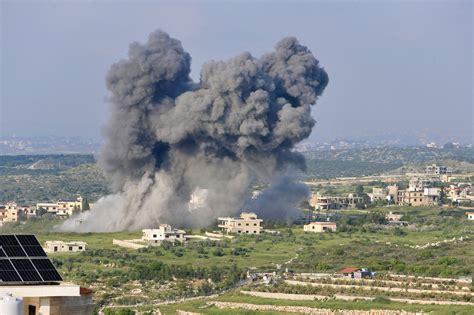
Top Hezbollah commander who ‘plotted terror attacks against Israel & missile blitzes’ killed in airstrike, IDF says
Ismail Yusaf Baz, a senior commander who planned missile strikes against Israel was “eliminated” in a strike in the Ain Ebel area, according to the IDF.
The IDF has claimed that one of their aircraft hit the region, just 7km north of Israel, on Tuesday night.
A spokesman said: “Ismail was involved in the promotion and planning of rocket and anti-tank missile launches toward Israel from the coastal area of Lebanon.
“During the war, he organized and planned a number of terrorist attacks against Israel.”
The IDF has also claimed that it “eliminated” the Commander of the Rockets and Missiles Unit of Radwan Forces’ Western Rergion.
In a separate statement, the IDF alleges that one of their aircrafts struck down Muhammad Hussein Mustafa Shechory in an attack on the area of Kfar Dounine.
Muhammad had been responsible for planning missile strikes towards Israel from the centre of Lebanon.
The IDF added that: “During the strike, Mahmoud Ibrahim Fadel-Allah, a terrorist operative of Hezbollah’s Rockets and Missiles Unit was also eliminated.”
Hezbollah and the IDF fought fire with fire on Tuesday, with the Iranian-backed militants launching explosive-laden drones at northern Israel.
Local reports suggest that three people were injured in the attacks.
In a statement, Hezbollah claims that it targeted Israel’s Iron Dome defence unit in Beit Hillel, claiming that they had directly hit it and killed several crew members.
Hezbollah is yet to comment on the IDF’s claims that they killed Ismail Yusaf Baz, Muhammad Hussein Mustafa Shechory, or Mahmoud Ibrahim Fadel-Allah.
The latest claims come as part of a series of strikes against Hezbollah commanders in recent months.
Last month, the IDF released footage of the deputy commander of Hezbollah’s rocket and missile unit being killed in an Israeli airstrike.
Ali Abed Akhsan Naim’s car was targeted by an Israeli drone as he was driving down a road in Bazouriye, southern Lebanon.
The Israeli military said on March 29 that Naim was one of the Iranian-backed militia’s leaders in heavy-warhead rocket fire, responsible for conducting and planning attacks against Israeli civilians.
At the time, Lebanon’s state-run National News Agency reported that “a raid by an enemy drone targeted a car” in Bazouriyeh and killed at least one person.
Several other Hezbollah commanders have been killed using similar tactics, with both Ali Hussien Barji, the leader of Hezbollah’s aerial forces, and Wissam al-Tawi, a leader in the Radwan force, having their cars targeted by drones.
Israeli airstrikes in southern Lebanon have killed around 270 Hezbollah combatants and 50 civilians, including doctors, civilians, and journalists.
Yet, Israel’s Defence Minister Yoav Gallant has personally blamed Hezbollah for all of the damage caused to Lebanon.
He said: “The one responsible for the serious damage in Lebanon is Hezbollah and the one responsible for the many casualties in the Hezbollah group is [Hassan] Nasrallah personally.
“They have over 320 terrorists killed, and we will exact a price for any action that comes out of Lebanon.
“Wherever we need to act, we will act.”
Increased tensions
The violence flaring between Israel and Hezbollah comes amid heightened tensions after Iran retaliated against Israel for a deadly attack on the Iranian consulate in Damascus on April 2.
Iran said seven of its Islamic Revolutionary Guard Corps (IRGC) military advisers, including senior commanders, were killed after Israel bombed the embassy.
Brig-Gen Mohammad Reza Zahedi, a senior commander of the elite Quds Force, and his deputy Brig-Gen Mohammad Hadi Haji-Rahim have been named among those dead.
The ambassador is understood to have survived, and Iranian state television reported this was an “assassination attempt”.
Iran has since responded, with 300 drones and missiles launched towards Israel from Iran and its proxy groups in Lebanon and Yemen on April 13.
The Israel Defence Forces (IDF) said 99 per cent of the missiles were intercepted by its air defences – with the help of the US navy and Britain’s RAF, whose forces downed drones over the Iraq-Syrian border.
RAF pilots shot down “a number” of attack drones, Prime Minister Rishi Sunak confirmed on April 14.
But the IDF said a small number of the ground-to-ground Iranian missiles did strike Israel, wounding a girl and causing minor damage to a military base in the south.
UK defence secretary Grant Shapps condemned Iran’s “senseless” attack, insisting it “serves no benefit other than to further undermine regional security”.
While Foreign Secretary David Cameron said: “Iran’s reckless attacks on Israel will only further inflame tensions in the Middle East.
“The UK calls on the Iranian regime to stop this serious escalation, which is in no one’s interest.”
Earlier on Saturday Mr Netanyahu had said Israel was prepared for a “direct attack from Iran” following its threats of retaliation for a deadly air strike on its Damascus consulate.
“Our defence systems are deployed, we are prepared for any scenario, both in defence and attack,” he said in a televised statement, adding that Israel had the backing of the United States and “many” countries.
Source » thesun.co.uk





